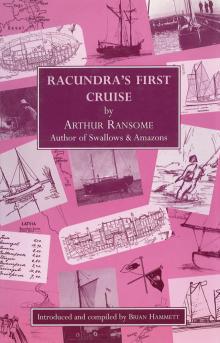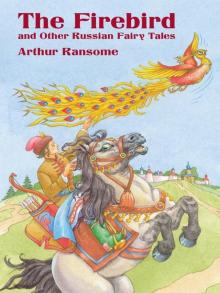- Home
- Arthur Ransome
Secret Water Page 2
Secret Water Read online
Page 2
CHAPTER II
ADVENTURE AHEAD
“ALL HANDS!” SAID Daddy, as they sat down to breakfast.
“Wait till they’ve had their porridge,” said Mother.
Daddy laughed.
“Oh do tell us now,” said Titty.
“You heard what your Mother said.”
“Oh Mother!”
“You get your porridge down,” said Mother. “But don’t go and eat it too quickly.”
“Or too slowly,” said Roger, swallowing fast. “Slop it in, Bridget. Bridget doesn’t know how to eat porridge. When you’ve got a mouthful in, don’t just wave the spoon about. Get it filled while you’re swallowing.”
“Don’t you hurry, Bridgie,” said Daddy. “News’ll keep.”
“Anybody want any more porridge?” said Mother presently.
“Nobody does,” said Titty.
“What about Roger?”
For a minute or two everybody had been watching Bridget, whose eyes wandered from face to face as she worked steadily on, spoonful by spoonful. Roger looked at the porridge still left on her plate. He could have a little more and yet be done as soon as she was.
“Yes, please,” said Roger, and passed his plate.
Bridget eyed him balefully and put on speed. It was a very close thing. Roger was still swallowing his last mouthful while Susan was wiping a stray bit off Bridget’s chin.
Daddy looked at Mummy. She nodded.
There was a breathless pause.
“Now look here,” said Daddy. “Mummy and I have been talking it over. We can’t come. I’ve got to be in London. Mummy’s got to come with me for part of the time anyhow. It all depends on John and Susan. If John and Susan will guarantee to keep the rest of you out of trouble, how would you like to take on that bit of exploration for yourselves?”
“Gosh!” said Roger.
“We won’t need to be kept out of trouble,” said Titty.
“Well, John?” said Daddy.
“But would Jim Brading let us have the Goblin without you?”
“No, he jolly well wouldn’t. Not if he could help it. Once was quite enough for him. What I propose to do is to take you round in her, dump the lot of you at the place he told us about, and come back and take you off as soon as my Lords of the Admiralty give me a chance. What about it, Susan?”
“We’ll be awfully careful,” said Susan.
“You’ll have to be,” said Daddy. “Tidal water. This won’t be like camping in the lakes. Where’s that chart? And the blank map?”
Daddy showed them the chart Jim had lent him, with a cross marking the best place for landing. “That’s where we’ll land,” he said putting his finger on the spot. “And there’s a farm here, where you see that little square.”
THE BLANK MAP
“Native kraal,” said Titty.
“Are we going to have the chart?” asked John.
Daddy showed them the blank map he had made for the expedition when he had thought that he and not John would be in charge of it. “No,” he said. “You’ll have this instead. I’ve copied it roughly from the chart, but that’s all. It’s the sort of map people might have of a place that had never been explored. Those round lumps may be islands or they may not. Tide’ll make a lot of difference. A lot of it’s marsh covered at high water. I’ve marked just three things on it. Two of them are taken from the chart. That cross is the place where I’m going to put you ashore. The square is the farm, but this dotted line is the most important of all. See it, everybody? Nobody, on any excuse whatever, goes outside that line. No more drifting out to sea in fogs. Agreed?”
“Agreed.”
“How can we drift at all without a boat?” said Roger.
“You couldn’t explore islands without one, could you?” said Daddy. “I’ve borrowed a boat for you, and we’ll tow her round.”
“Brown sail?” asked Roger. “Like Swallow’s.”
“What’s her name?” asked Titty.
“Where is she?” asked John and began to get up from the table.
“Plenty of time after breakfast,” said Mother. John sat down again and looked out of the window. Close to the boat-builders’ shed two men were cleaning a dinghy, and a brown sail, wrapped round its spars, was propped against the wall beside them.
“Is that her?” asked John.
“Maybe.”
“But no sailing outside the dotted line,” said Mother. “No going out to sea, even without meaning to.”
“It won’t happen again,” said Susan.
“Anyway not in a dinghy,” said John.
“Going to let me finish what I was saying?” asked Daddy.
“Do go on,” said Titty.
“You’ll start with a blank map, that doesn’t do more than show roughly what’s water and what isn’t. You’ll have your tents, stores, everything we’d got ready when we thought we were all going together. You’ll be just a wee bit better off than Columbus. And with all the practice you’ve had at exploring, I think you’ll do pretty well. But you’ll be marooned fair and square. You’ll have to depend on yourselves alone. There’ll be nobody coming along every day to see that you’re all right.”
“Marooned?” said Roger.
“What happened to Ben Gunn,” said Titty. “They gave him a gun and put him on an island and sailed away and never came back.”
“Oh,” said Roger.
“We’ll come back for you all right some day,” said Daddy.
“When?” said Susan.
“Don’t say,” said Titty. “Much better if we don’t know. We’ll grow old and grey watching for a distant sail. …”
“Not very old,” said Daddy. “And you won’t have time to get very grey before you have to stop being explorers and go back to school.”
“Don’t spoil it,” said Titty.
“Do you really think you’ll be all right there by yourselves?” said Mother.
“We will,” said almost everybody at once.
“Hullo, Bridget,” said Daddy, “what’s the matter?”
“What’s going to happen to me?” said Bridget, who had been growing more and more solemn. “You said you were going to take me when we were all going. Don’t let them leave me behind again. I’m quite old enough to go.”
“Ask Susan if she’ll have you,” said Daddy. “I’ll be glad if she will. May as well maroon the lot while we’re about it.”
“You’ll be a strong expedition,” said Mother, half smiling, and half comforting herself. “A captain and a mate and two able-seamen and a ship’s baby.”
“What about Sinbad?” asked Titty.
“We can’t ask Miss Powell to look after him,” said Mother. “There’ll have to be a ship’s kitten as well.”
“Then I won’t be the youngest,” said Bridget.
“Not by several years,” said Daddy. “Ah, thank you, Miss Powell. …”
Miss Powell had come in and set a huge dish with a cover on it before Commander Walker. She lifted the cover and the little room was full of the smell of fried bacon. There was a busy minute or two while people were burning their fingers passing round hot loaded plates.
“No more talking,” said Daddy. “Finish your breakfasts. No seaman lets hot bacon and toast get cold if he can help it. And there’s no time to waste. High tide today about a quarter past two. We’ve got to be at the islands before then. All that stuff to be put aboard and we’ll have to be sailing by twelve.”
“Gosh!” said Roger. “Today. …”
He was too busy to say more, and after that there was silence except for the crunching noise natural to toast when being eaten.
*
Four men were carrying a sailing dinghy down the hard to put her in the water. Four explorers, who only an hour before had thought that for this summer at least their exploring days were over, raced down the hard in pursuit. Daddy followed in less of a hurry. Bridget had stayed behind to help Mother to turn a thick woollen blanket into an explorer’s first sleeping
bag.
“She’s as big as Swallow,” said John.
“She’s called Wizard,” said Titty, looking at the name on the boat’s stern.
“Because she whizzes, I expect,” said Roger.
The men slid her into the water. Daddy had a look at her gear and hoisted her brown sail. John and Daddy went off to try her while the others waited. Then John came ashore and Susan took his place. Then Daddy sailed with Roger and Titty together and watched them handle her in turns. Everybody got full marks, including Wizard.
“Now then,” said Daddy. “We’d better borrow a wheelbarrow. We’ve got our work cut out to get all that stuff aboard.”
The boatbuilder lent them a wheelbarrow and they took it to the steps below Miss Powell’s cottage. Mother was sitting on the wooden seat at the top of the steps, sewing away at Bridget’s sleeping bag. Bridget was telling Sinbad he was going to sea. Miss Powell was cutting an enormous pile of sandwiches to be eaten on their way down the river. Daddy had hurried up the hill to buy all the chops in the village so that they could take them ready-cooked to make things easier for their first meals on the island.
“I don’t believe you’ll ever get all that stuff into the Goblin,” said Mother.
“There’s a lot of room in her,” said John, but that inner room at Miss Powell’s looked pretty full.
“Come on,” said Titty. “Let’s everybody carry something.”
Journey after journey was made from Alma Cottage to the dinghy floating by the hard. John, or Daddy after he had come back with the chops, pushed the wheelbarrow at the run, while others ran alongside keeping things from falling off. Voyage after voyage was made from the hard to the Goblin. Bit by bit that inner room began to look more like a room in somebody’s house and less like a general store. It was extraordinary how different everybody felt. Yesterday it had seemed that adventure was over at least for these holidays. Today, adventure was ahead … just round the corner. Real exploration … Islands, and islands of a kind they had never seen … an empty map to be filled with the discoveries they would make themselves. A little way upstream among the other yachts they saw the big yellow cutter with the three sailing dinghies clustered round her, and a boat from the shipwright’s lying astern of her. Men were working aboard her. That girl and the two boys dropped into the dinghies and went off for a sail up the river. But today it never occurred even to Roger to call them pudding faces. There was no need to envy them. They were not going to sleep that night on an unknown island. They were not going to be marooned. They would not watch a ship sail away into the distance leaving them to pitch their camp and face the world alone. Roger looked at them with pity. “Those children again,” he said.
“I do believe that’s all,” said Susan, back at the cottage looking round the room. The table had been cleared. Chairs that had been piled high were fit to sit upon once more. Everything left in the room belonged to it and not to an exploring expedition. Susan looked carefully round, straightened the tablecloth, and put a chair (that had somehow strayed) neatly in its place against the wall. “I don’t believe we’ve forgotten anything.”
“Swallow’s flag,” said Titty, and darted upstairs to fetch it.
“Will it be all right to fly it on Wizard?” asked Roger, as she came down with it.
“We must fly it over the camp,” said Titty.
Mother’s voice came from outside. “A glass of milk for everybody,” she said. “You’ve earned it after all that racing up and down.”
“Pretty good work,” said Captain Walker, pulling at his pipe. “Well done the Able-seamen.”
“How soon will I be counted Able-seaman?” asked Bridget.
“Not till you can swim,” said John.
“And she mustn’t try swimming this time,” said Mother, “because of the tides.”
“And the mud,” said Daddy.
“And the sharks,” said Roger.
And then Daddy asked how many of the others had got their life-saving certificates, and handed out half a crown to each of them, on hearing that Roger and Titty had got theirs in the summer term at school, and that John and Susan had got theirs the year before.
“Penny for your thoughts, John,” said Mother, after John had been silent for a minute or two.
“No good offering him a penny when I’ve just made him a rich man,” said Daddy. “Out with it John, all the same.”
“I was only thinking what a pity it is that Nancy and Peggy can’t come too.”
Daddy and Mother looked at each other but said nothing.
“Captain Nancy’d just love being marooned,” said Titty. “But I expect they’re doing something too. Sure to be. They’ll probably write and tell us about it. She wouldn’t have sent three million cheers unless they were up to something pretty larky.”
“They won’t be doing anything as good as this,” said Roger.
Captain Walker looked at his watch.
“NO NEED TO ENVY THEM NOW”
“Are you ready, Mary?” he said. “All aboard. Hurry up and say goodbye to Miss Powell. We’ll have to start at once to make sure of having the tide with us going in.”
PIN MILL
CHAPTER III
INTO THE UNKNOWN
THE GOBLIN WAS floating well below her usual water line as she left Pin Mill to sail down the river into the unknown. She had never been so laden before. Inside her there was hardly room to move. Stuffed knapsacks, cases of ginger beer, tin boxes and bundles were piled on the cabin floor and in the bunks. Huge rolls of oilskins and ground sheets had been lashed down on the cabin top. A bundle of long bamboos for surveying was made fast on one of the side decks. And beside their gear there were all the members of the expedition. John, Susan, Bridget (on her first sea voyage) and the kitten, Sinbad, were in the cockpit. Titty and Roger were on the foredeck. Down below in the saloon, Commander Walker was ticking things off on a list and telling Mother that everything was really quite all right and that there was nothing about which to worry.
“It isn’t as if there wasn’t Susan,” he said, “and it isn’t as if John had no sense. I say, John. You keep straight down the middle of the river. I’m going to turn the engine on to get us quickly down over the tide.”
“Aye, aye, sir,” said John seriously. He, like Susan, had heard that their father was depending on them.
The engine started chug, chugging beneath them. Roger scrambled aft in a hurry, to be allowed to push the lever forward and put it into gear. The Goblin’s wake lengthened, and the water creamed under the bows of Wizard, the sailing dinghy, towing astern.
In the cockpit, they had to shout to each other to make themselves heard over the noise of the engine, and could no longer hear what was being said by the friendly natives in the cabin. But there was little need for talk while everybody, even John the steersman, was busy with sandwiches and ginger beer.
They passed boats not in a hurry going slowly down under sail alone. They met boats coming up fast with the tide. They were interested in all of them, but the Goblin, they knew, was the only boat that was on her way to maroon a party of explorers on an island. The wooded banks slipped by and were left behind. The river opened into the wide harbour. They looked up the Stour and pointed out to Bridget where they had spent their first night in the Goblin anchored off Shotley pier. They drove down past the dock where (how long ago it seemed!) they had seen Jim Brading row in for petrol before the fog had come down on them like a blanket. Ahead of them once more was the Beach End buoy.
“Listen!” said Titty at the top of her voice.
“I can hear it,” shouted Roger.
“Clang! … Clang! … Clang. …”
It was very different, hearing the bell buoy now with Mother and Daddy aboard, and bright sunshine everywhere, from what it had been, hearing that “Clang … Clang …” coming blindly nearer in the fog.
“We’re nearly out at sea,” said John.
“John says we’re nearly out,” Bridget called down into the cabin.
>
Commander Walker put his head out, looked round and went down again. The chug, chug of the engine came to an end.
“We shan’t want that now,” said Daddy, coming on deck again and talking quietly in the sudden silence made by the stopping of the engine.
They made as much room for him as they could and he sat on the after deck looking at Jim’s chart.
“I’ll take over now,” he said. “John, you’ve got the best eyes. Get forward by the mast and keep them skinned. Look out for a small black buoy with a square topmark.” He changed the Goblin’s course, and looked at the compass. “We ought to be heading for it now.”
John scrambled forward. The sea was smooth, the wind light, but the Goblin seemed to be moving faster than when she had been coming down the harbour with her engine going. The tide was with her now instead of against her and they could see by the buildings ashore how fast they were moving. Nobody even felt like being seasick.
Away to the south was a bit of a hill with a tall narrow tower. Ahead of them was a wide deep bay with a low straight coastline far away in the distance. John, standing by the mast searched for the buoy. Suddenly he saw a black speck dancing on the water.
“Small black buoy almost dead ahead,” called John.
“Piccaninny,” said Roger.
“It’s got something on the top of it,” said Titty, who, looking where John was looking, had managed to bring her telescope to bear.
“That’s the fellow,” said Daddy. “See any others?”
“There’s another beyond it.”
“Good.”
Soon they were sailing close past it, a black tarred barrel, with a stick and a sort of squarish box on the top of it. Ahead of them was another black barrel, and far ahead of that was a red one with a pointed top.
“In the channel now,” said Daddy, and Mother came up the companion ladder and put her head out and looked away over the water which seemed to stretch for miles on either side of them.

 Peter Duck: A Treasure Hunt in the Caribbees
Peter Duck: A Treasure Hunt in the Caribbees Racundra's First Cruise
Racundra's First Cruise Great Northern?
Great Northern? Swallowdale
Swallowdale Swallows and Amazons
Swallows and Amazons Winter Holiday
Winter Holiday Missee Lee: The Swallows and Amazons in the China Seas
Missee Lee: The Swallows and Amazons in the China Seas Pigeon Post
Pigeon Post We Didn't Mean to Go to Sea
We Didn't Mean to Go to Sea The Firebird and Other Russian Fairy Tales
The Firebird and Other Russian Fairy Tales Coot Club
Coot Club The Big Six: A Novel
The Big Six: A Novel Six Weeks in Russia, 1919
Six Weeks in Russia, 1919 Secret Water
Secret Water The Big Six
The Big Six Missee Lee
Missee Lee Peter Duck
Peter Duck The Picts and the Martyrs
The Picts and the Martyrs